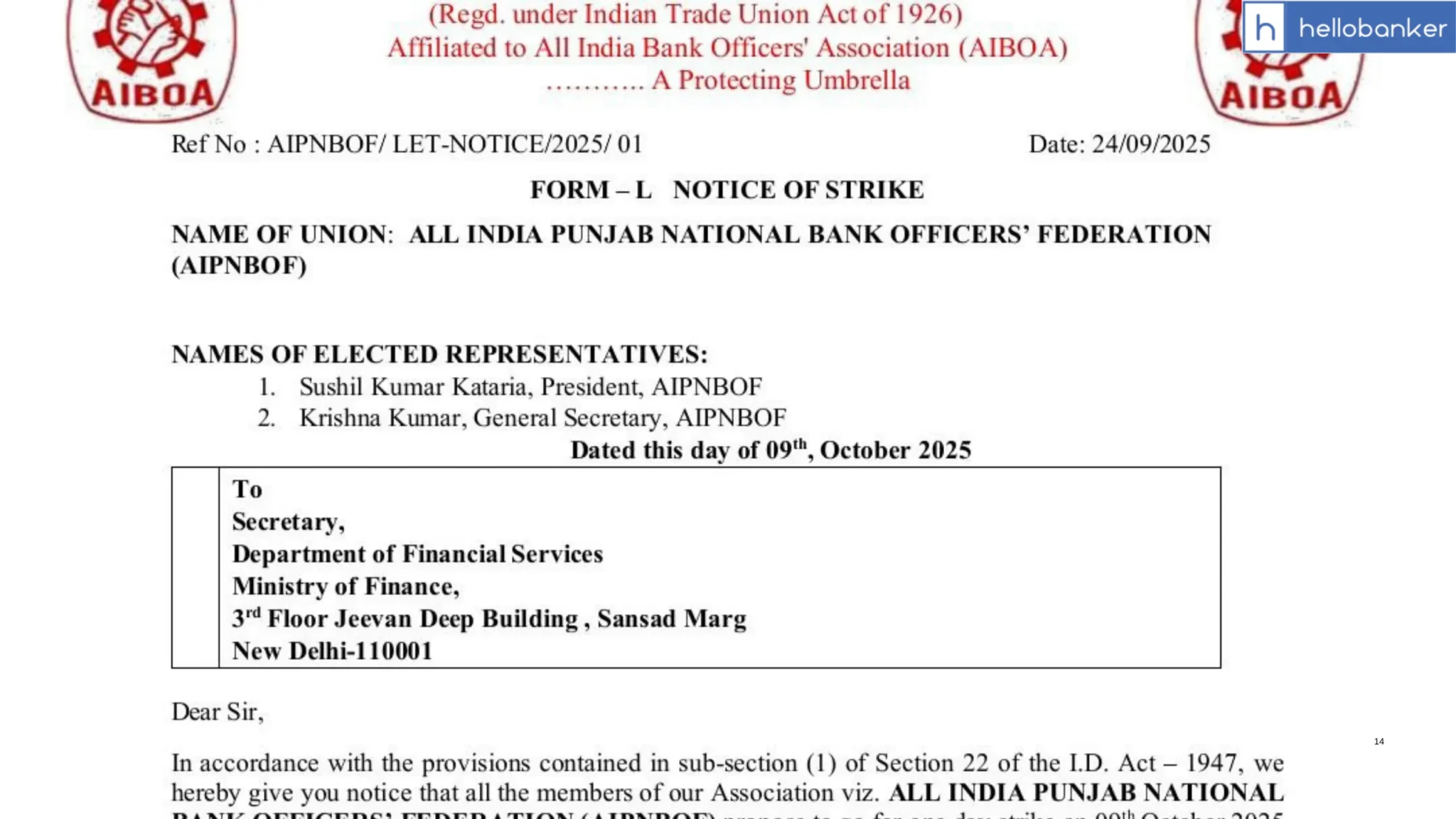New Delhi: The All India Punjab National Bank Officers’ Federation (AIPNBOF) has officially announced a one-day strike planned for October 9, 2025. This move follows demands for the declaration of all Saturdays as holidays in the banking sector, citing the Industrial Disputes Act of 1947. The strike could significantly disrupt services at Punjab National Bank branches if demands remain unaddressed.
Reasons Behind the Planned Strike
The All India Punjab National Bank Officers’ Federation (AIPNBOF), a prominent body affiliated with the All India Bank Officers’ Association (AIBOA), has taken a stand for employees by calling for a formal strike on October 9, 2025. The federation’s central demand is the official declaration of all Saturdays as holidays for the banking industry, based on guidelines from the Negotiable Instruments (NI) Act. As outlined in a letter sent to the Secretary of the Department of Financial Services, this decision follows provisions under the Industrial Disputes Act of 1947, showcasing the organized efforts by bank officers to advocate for their rights.
This push for weekend holidays resonates strongly within the banking community, primarily due to the demanding nature of banking jobs. Banking professionals often experience a high level of stress due to long hours and customer demands. For example, many employees have shared that a two-day weekend could greatly enhance their work-life balance, leading to improved employee morale and productivity.
Support from the Indian Banks’ Association
The AIPNBOF’s demands aren’t falling on deaf ears. The Indian Banks’ Association (IBA) has recommended to the Government of India that all Saturdays be recognized as holidays for banks, supporting the agreement made with the United Forum of Bank Unions (UFBU) under the 9th Joint Note dated March 8, 2024. This endorsement from the IBA signifies a growing recognition of the challenges faced by banking employees and the need for equitable work practices.
In a written statement, Krishna Kumar, the General Secretary of AIPNBOF, underlined the importance of these demands. “If the demand is not addressed, banking services across Punjab National Bank branches may be disrupted on October 9,” he stated, emphasizing the discontent among bank officers who feel overworked and underappreciated. This disruption could impact numerous customers relying on banking services for crucial transactions.
Impact on the Indian Economy
The planned strike may not only affect bank employees but could also have broader implications for the Indian economy. With the banking sector being a critical player in facilitating transactions, loans, and investments, any major disruptions in services can create ripple effects leading to delays in credit processing and inconvenient banking experiences for customers. This situation raises concerns, especially in the context of the current economic climate, where inflation rates and the ongoing recovery from the pandemic remain at the forefront.
To visualize the potential impact of this strike, let’s consider some key statistics:
| Key Statistics | Current Rates | Potential Disruption Impact |
|---|---|---|
| Inflation Rate | 4.5% | Possible rise due to disruption in transactions |
| Banking Sector Growth | 7% (2023) | Possible slowdown during strike period |
| Customer Transactions | 300 million daily | Estimated reduction by 20% on strike day |
Public Response and Future Implications
The response from the public and banking clients has been mixed. While many understand the demands of the bank officers, others express concern over potential disruptions to their banking services. Customers often rely on Saturdays for essential banking tasks, making the situation particularly challenging. If the strike goes ahead, many customers may need to adjust their schedules and banking plans, leading to frustration and inconvenience.
In conclusion, the situation surrounding the AIPNBOF’s planned strike highlights the ongoing tensions within the Indian banking sector. With the RBI closely monitoring inflation and economic stability, the urgency for addressing these employee demands becomes more pressing. Many hope that negotiations between bank officers and government authorities will yield a satisfactory resolution before the announced date, ensuring that banking services remain uninterrupted and that the well-being of bank employees is prioritized.
Bankerpedia’s Insight 💡
The impending one-day strike by the All India Punjab National Bank Officers’ Federation highlights growing discontent in India’s banking sector. This strike underscores the urgent need for work-life balance, particularly as banks navigate increased customer demands and digital transformations. Should the strike proceed, it may disrupt services and affect customer trust. For clients and stakeholders, staying informed about these developments is crucial, as it could delay banking transactions and services. It’s essential to plan ahead and utilize digital banking options during this potential strike period.
How Does This Affect the Banking Ecosystem? 🏦
- Bank Employees → One-day strike may disrupt banking services for employees.
- Bank Management → Potential disruption of services and operations on October 9.
- Bank Customers → Bank customers may face service disruptions on October 9.
- Investors / Shareholders → Potential service disruptions may affect investment stability.
- Regulators (RBI, SEBI, Govt.) → Potential service disruptions may impact regulatory oversight functions.
- General Public → Bank services may be disrupted on October 9, 2025.
Research References 📚
Loved our Research? ❤️
Bankerpedia turns financial confusion into clarity!
Subscribe to our YouTube channel for unbiased insights, financial literacy & practical banking wisdom.










